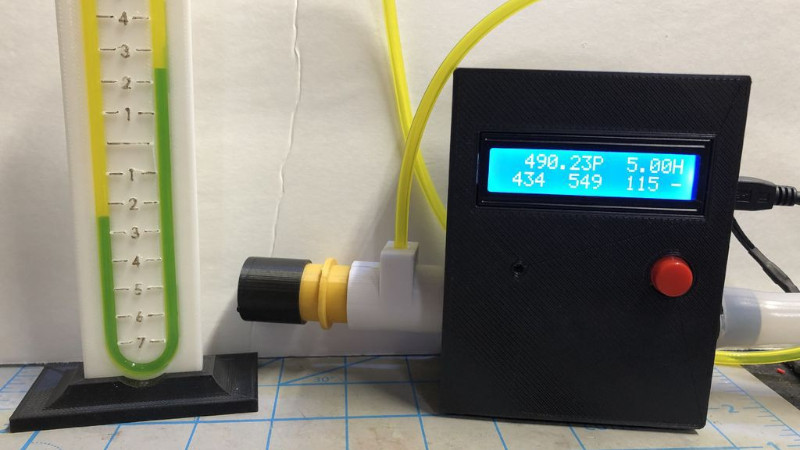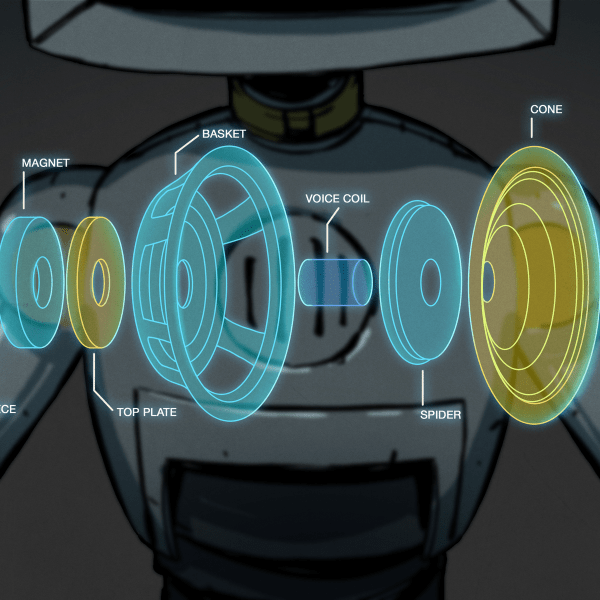Continuous Positive Airway Pressure machines are a common treatment tool for sleep apnea and other respiratory issues. A common problem with their use is that the mask becomes dislodged during sleep, and thus fails to provide airway pressure to the patient. [Bin Sun] decided to take a stab at solving this problem.
The project consists of an Arduino fitted with a MPXV7002DP pressure sensor. The sensor is used to monitor the pressure in the CPAP pipes. If the pressure varies regularly, it is likely the system is working. If however, the pressure remains at a roughly constant level, that suggests the mask is no longer properly fitted to the wearer, or that there is another problem. In this event, the device sounds a buzzer to wake the wearer, alerting them to check the equipment.
It’s a simple solution to the problem, and something we’re surprised isn’t built into most CPAP machines from the factory. It’s important to be careful before modifying any medical equipment, though we see plenty of hackers taking the plunge to innovate in this area.


















a lot (if not all) of current CPAP devices have a differential pressure sensor to detect breathing, not sure about alerting though
Bigger problem, why don’t the machines have these fail-safes?
Poorly designed, over-priced poor quality, prone to infection over poorly designed “consumables”.
They do — at least IME
Thank goodness it’s not what I first misread the title to be.
You are not alone….
Don’t think I need a monitor to alert me of those malfunctions.
Ugh. I do, unfortunately. My crap is always malfunctioning.
Misread the title, assumed the device was some kind of enhanced baby monitor to identify when to change nappies.
I’d like to see one of these, actually.
My misreading was that it was some crappy machine that failed a lot, but gave you notifications of said failures. “Hey just reminding you that I’m crappy”
CPAP stands for constant positive airway pressure. The blower in the machine works to keep the pressure in the mask/tube constant, whether you’re inhaling or exhaling. I’m not sure monitoring the pressure is the best way to look for a dislodged mask. I think it would be better to monitor the flow- if the mask comes off, the flow will by high and in one direction. Also, the noise level will increase quite a bit if the mask comes off, so you could simply monitor the sound level.
If the mask comes off, there’s no way to maintain the pressure, regardless of how hard the blower blows.
Being a CPAP pacient for 10 years, flow detection + pressure works best to detect dislodged masks.
On the other hand, personally, I wouldn’t want something beeping at me, I already have a bad sleep thank you.
Besides, if the CPAP has a power failure or mask failure(both extremely rare for me), I tend to wake up gasping for air. At least I haven’t died from choking yet!
Thats what I was going to say 99% of the time you know if it stops and when it falls off it sounds like an air compressor hose
reading car forums across the globe CPAP machines seem fairly common in the states but nowhere else? is that just me or is my sample size just too small. used to date a girl (in the UK) who suffered BAD from sleep apnea, (she kindly neglected to tell me about it the first night she stayed over, that was plesant) and dont recall any professionals ever recommending a CPAP
True apnea or just snoring? Snoring itself isn’t a problem, it’s when the person stops breathing altogether (which is completely silent) regularly during sleep, forcing the brain to keep waking up and never getting into the deeper sleep modes that it needs.
Here in .fi, CPAP machines are relatively common among elderly people, but if the sleep apnea is due to obesity, doctors here usually try to just push the patient to lose some weight.
This feature is built into the one I sleep with. If the mask comes off, it beeps till I wake up and reseat the mask. As others have commented, it usually isn’t the beeping that wakes me: it’s the not breathing/gasping for air.
Many CPAP systems allow the user to see a report each morning if they choose to look at it. The majority seem to never even browse these more than once just to see what information is being presented.
Physicians generally ask that you bring your CPAP with you to appointments. They read the memory card which stores a wealth of information most patients would be unlikely to know how to respond to but the physician can use to effectively provide directions to the patient., as well as determine if any settings changes are appropriate and thus reduce the number of inpatient sleep studies that are required. About all the patient can do in any event is replenish the water reservoir or tighen/replace their mask and/or chin strap, and replace air filters.
I recognize the model shown. It is fairly current and provides more information to the patient than most can use.
Perhaps there are different levels of machine. I have one that looks exactly like that and it has a built in cell modem. Apparently my insurance company requires reports indicating I’m in compliance with use or they won’t cover the rental and consumables. 21 days a month with at least 4 hours of use. I’m sure that the company that I get it and the supplies from charges them (me) a lot of money for it so I can understand why the insurance company wants me to be using it.
I find that the quality of my sleep hasn’t improved, but I fall asleep significantly faster. It used to take me about 45 minutes to an hour, now it’s like 5 minutes.
If you’re sleep isn’t improved you need to see the docs again.
mine significantly improved, and stays improved, until the stupid tubes crack and start leaking air. Why on earth they are so flimsy, considering they get wrapped around my head, arms, neck, etc is beyond me, other than the fact when I looked at paying for a replacement myself, they are £90!.
Fortunately the NHS works, and they replaced it for me.
” find that the quality of my sleep hasn’t improved, but I fall asleep significantly faster. It used to take me about 45 minutes to an hour, now it’s like 5 minutes.”
Okay, my experience is just the opposite, before the CPAP, I fell asleep almost instantly ( I was SO tired!)
Now it is 20 minutes of “getting comfortable”.
Those of us with CPAP machines can now read the data stored on the SD cards in the machines. The data is encrypted but there is software available here: https://www.sleepfiles.com/OSCAR/ that allows it to be decrypted and even allows editing of the machine’s operating parameters.
Also sleepyhead for Mac’s.
Thanks!
(bookmarked)
It is totally common to hear that something hugging your face helps you to fall asleep quickly once you’ve grown used to it. The mask pressing on your face gives you a very positive ritual/signal that it’s beddy-bye time, and your body will quickly learn and take this cue. Completely common. But this is just “mask on face” helping you to fall asleep quickly.
You want the positive airway pressure to keep your airway open during sleep as is the point of the machine. You should definitely feel more rested but say you are not, and this means you should inform your physician of this at this time.
Interesting project.
Which should not have to be built.
CPAPs internally measure the pressure, and record it on the SD card.
They should make them so they broadcast the information over bluetooth.
Then a cell-phone (or similar) program could monitor, and
if desired give an alarm when problems occur (such as excessive leak,
or power outage).
Instead of having to mess with the machine if you wanted a report in the morning,
your cell phone should just have quick feedback – which you can tailor to
highlight any problems (like setting what level of mask leak to alert me to).
(Or it could send you an e-mail if there were any problems.)
This would be especially helpful for monitoring somebody else’s CPAP
(e.g. for a child, or somebody who is less able).
A nice extension to the project would be to add remote notification ability – wifi, etc. That would help those caring for somebody who uses CPAP, but is less able/willing to adjust themselves. (Children, less able, etc.)
It’s estimated than 1 to 4 percent of children suffer from sleep apnea. Studies have suggested that as many as 25 percent of children diagnosed with attention-deficit hyperactivity disorder may actually have symptoms of obstructive sleep apnea and that much of their learning difficulty and behavior problems can be the consequence of chronic fragmented sleep.
Oops – forgot to give source.
https://www.sleepapnea.org/treat/childrens-sleep-apnea/
They also should have a connector on them for an auxilary power supply.
If main power goes out, it would draw on the auxilary supply connector would power the electronics and the blower, but not the heater.
(One should not have to be woken up, and mess with turning off the heater
and connecting a battery.)
I can not believe some of the comments. This is an excellent idea . You are able to snatch your mask off if something goes wrong, But what about our seniors or disabled patients and family members that are unable to move, speak, or just doesn’t have the strength to take off the mask in an emergency? A family member or Nurse should be alerted..
My 82 year old disabled father unable to speak was in the hospital and they gave him a Cpap machine for the first time ever. I came the next morning and found him strapped to the bed and was told that he took his mask off in the middle of the night so the strapped him to the bed!! I’m sure he was experiencing that feeling of Suffocation that happens when the machine malfunction.
The hospital nurses normally Convinces the families that the patient is confused and woke up fighting. Believe it or not, this happened to my dad.
How many have already lost their lives due to unknown causes and then being told “He just stopped breathing “? Would it every have Occurred to you that maybe the CPAP machine malfunctioned. Probably not! And I Doubt the monitoring tech would Reveal or even detect that the Cpap machine malfunctioned due to fear of job loss or lawsuits. Where was the nurse or family? If someone would have known that the Cpap machine malfunctioned a life could have been saved!
I strongly believe someone can Suffocate from the constant air pressure if you do not wake up to remove the mask if the machine malfunctioned.
I thank God that I was able to wake up and remove my mask when my air way totally closed and the machine began to supply constant air pressure that continued building up filling my stomach, throat, lungs, nose, and mouth. My mask was seal to my mouth and nose and I could not breathe because I was filled to capacity with air. I would Describe it as an Astronaut taking a walk on the moon and removing his space helmet. Imagine yourself trapped inside of a balloon filled with air.
I’m surprised that no one cares to install the alert option on the CPAP machines. this should be a feature that gives you the choice to turn it on or off it should be mandatory In hospitals